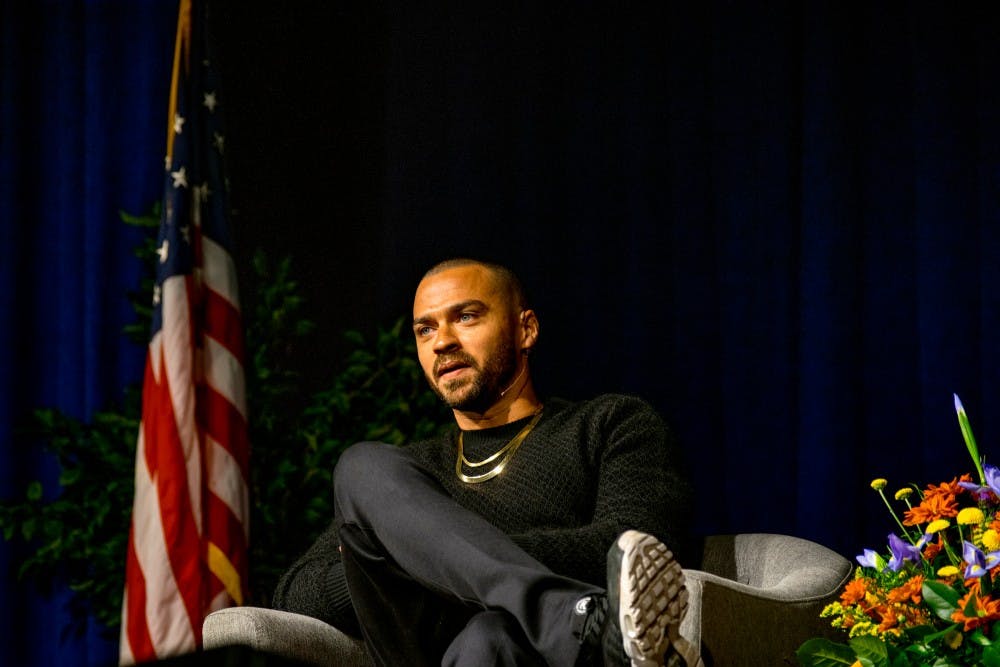Jesse Williams has come a long way from the young man with a “superb” afro stringing together jobs in corporate law, acting in commercials and waiting tables to make ends meet.
An energetic crowd packed Alumni Arena Saturday night, abuzz with chatter and letting out excited squeals even before Williams, an actor and activist best known for his portrayal of Jackson Avery on “Grey’s Anatomy,” stepped onto the stage.
SA President Leslie Veloz introduced Williams and Nanette Coleman, Q&A moderator, UB alumna and SA’s first African American president. Veloz said the entire lecture would be in Q&A format in order to facilitate “difficult discussions” about race and social inequality.
Williams never set out to be an actor. After college, he spent a lot of time “meandering” in different fields, trying to afford rent in New York City. He picked up a few roles in commercials and worked on student films as a way to make money. He never thought it would turn into a career.
Williams planned to pursue a career in law. He studied and took the LSAT but decided to give acting a shot for 18 months to two years. If it didn’t work out for him, he would go to law school.
His first serious acting job was a role in “Sisterhood of the Traveling Pants 2.” It didn’t pay well, and after going to glamourous premieres and being in a big time Hollywood film, Williams had nothing to show for it financially. In a humbling moment, he went back to waiting tables to pay his bills.
“I kept learning as a 20-something to juggle ego and expectations,” Williams said.
Williams’ television acting career started with small roles on “Law and Order” before landing the role of Jackson Avery on “Grey’s Anatomy.” Williams was originally slated to appear for two episodes, but his performance was so strong he became a series regular.
Williams discussed the role diversity plays in the show, and how it demonstrates the humanity and complexity of black, brown and LGBTQ people without being “preachy.”
“I picked that show because people are able to be human beings,” Williams said. “Black, brown, LGBTQ folks are able to exist and not have to be demonstrably so, not
Williams believes there’s a “big lie” in corporate America that films and television shows with white leads are more profitable. White industry moguls use this lie to cover up their racism by claiming their failure to cast diverse actors is a business decision, according to Williams.
“But what’s proven to be true is the more diverse a movie is, the more money it makes. Full stop,” Williams said. “It’s a lie that movies need to be white. The more black and brown people you have in things, the more money it makes.”
Activism has always been a part of Williams’ life. He grew up in an activist household. Political organization meetings were held in his parents’ living room. Williams was raised to stand up for social equality. He started engaging in activism during his time at Temple University.
While Williams is grateful to have a large platform to express his views and advocate for social justice, he does not think everyone with a large platform has a responsibility to speak out.
“I don’t demand that of others, I don’t think that’s fair,” Williams said. “And sometimes people can do more harm than good by opening their mouth.”
Williams also addressed the importance of self-care. He said it is something he still struggles with, especially after two bouts of getting “extremely burnt out.” He recently started transcendental meditation which he does twice a day and goes to therapy.
“I love therapy,” Williams said. “It’s kind of an unusual way to describe it, but it’s like a hallucinogen. It opens up the world for me and allows me to work to my best potential.”
He said the most powerful self-care tool he can use is simply saying “no.”
“You know, saying no and not having to please other folks and just making some time for yourself,” Williams said.
Williams is ultimately optimistic about the future of diversity in the entertainment industry, but that doesn’t mean he will stop advocating for what he believes in.
“I absolutely feel hopeful and positive and I can do that while also being a button pusher and a disrupter and someone who holds their feet to the fire at every turn,” Williams said.
The next speaker in this year’s 31st annual Distinguished Speaker Series will be Ambassador Susan Rice, former national security adviser for President Obama. She will present UB’s 42nd annual Martin Luther King Jr. Commemoration keynote address on Feb. 28.
Maddy Fowler is the editorial editor and can be reached at maddy.fowler@ubspectrum.com





